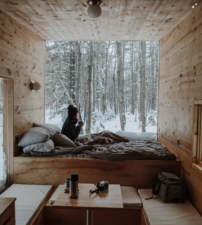Israeli solar energy innovator Sunday Energy has been chosen to construct a solar energy panel array in a section of the country’s Negev desert region, according to an article in Globes financial news.
The 5 mw installation will be constructed together with Moshav Yad Natan in a 120 dunam (42.5 acre) area where the land as been designated as “damaged” or non-usable due to either extensive agricultural use or from erosion. Cost of the project is estimated to be around $26.3 million and will include photovoltaic (PV) solar panel arrays, engineering facilities and water reservoirs to supply the water needed to supply steam for the turbines that will generate the electricity.
Sunday has been mentioned several times by Green Prophet, including the company’s involvement in projects such as its innovative solar energy idea to “boost power output on water” as well as its teaming up with another Israeli clean tech company, Ormat Industries, to construct solar energy projects valued at more than $195 million, which will include solar energy systems with a capacity of as much as 37 mw.
These projects, along with the news one noted by Globes, clearly indicate a bright future for this company as an innovator and supplier of PV solar energy systems.
The use of non arable land for these types of projects is a good idea as it enables such land to be put to good use and frees arable land for agriculture use. A similar project by Sunday has also been slated at another Negev settlement, Kibbutz Zeelim, which will also entail a 5 mw solar panel array at a similar cost. A considerable portion of Israel’s Negev desert region is considered as non-arable; and solar energy projects such as these may eventually be able to supply a sizable portion of the country’s electricity needs.
This need for “going solar” was asked recently by the UN Environment Program to Israel to use more solar energy for domestic use rather than merely exporting the technology abroad. It makes sense that solar energy power plants produced by companies like Sunday will be in use more and more in a country that has little natural resources other than this very common one – the sun.
:: Globes
More on Sunday Energy and Israeli solar energy:
The U.N. Asks Israel to Use More Solar Power
Sunday Energy Helping to Produce Israel’s First Solar Powered Wine
Ormat and Sunday Solar Power Up in $195 Million Deal




folaota
This is a great example of companies being smart about developing solar power. Using land that can't be used for anything else to build solar “farms” is a good idea. My only concern is that the article mentioned that some of the land wasn't usable because of erosion. Would this affect the solar arrays?
This is a great example of companies being smart about developing solar power. Using land that can't be used for anything else to build solar “farms” is a good idea. My only concern is that the article mentioned that some of the land wasn't usable because of erosion. Would this affect the solar arrays?